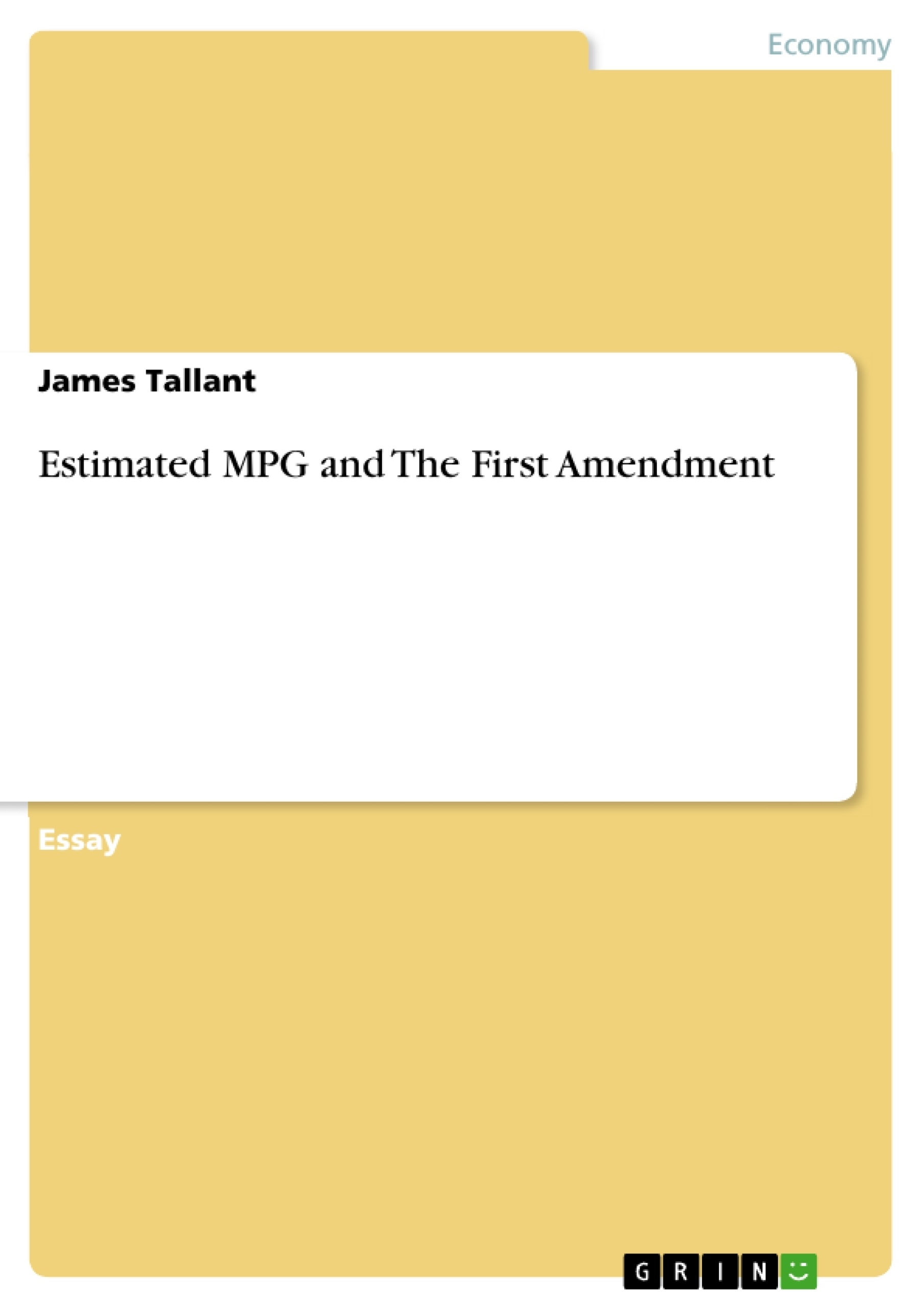Estimated MPG and the First Amendment
The U.S. Constitution is the official rulebook of individual and business behavior in the United States. Without the Constitution and its amendments, judges, juries, and lawyers would be unable to litigate equitable justice. Businesses, just as individual citizens, must adhere to the articles and amendments in the Constitution. Moreover, the importance of the Constitution cannot be over emphasized since “fully half of the provisions of the Constitution govern commerce” (Roberts, 2005, p.24, ¶2). One of the widely used, contested, and defended Constitutional amendments’ regarding business dealings is the first amendment.
Inhaltsverzeichnis (Table of Contents)
- Estimated MPG and the First Amendment
- The First Amendment and the Auto Industry
- The Central Hudson Test
- Manufacturer’s Defense
- Proper Use of the First Amendment
- Conclusion
Zielsetzung und Themenschwerpunkte (Objectives and Key Themes)
This paper examines the intersection of the First Amendment and the automotive industry, specifically focusing on the issue of misleading MPG ratings. The paper analyzes how the First Amendment's protection of free speech applies to advertising and marketing practices in the context of fuel efficiency claims. The paper also explores the legal challenges faced by auto manufacturers and dealerships when they are accused of deceptive advertising.
- The First Amendment and its implications for commercial speech
- The Central Hudson Test and its application to evaluating advertising claims
- The legal defenses used by auto manufacturers against accusations of deceptive advertising
- The role of the Environmental Protection Agency (EPA) in setting and enforcing MPG standards
- The importance of accurate and truthful advertising in the context of fuel economy
Zusammenfassung der Kapitel (Chapter Summaries)
This chapter discusses the importance of the Constitution and its implications for businesses. The author argues that the First Amendment's protection of free speech is crucial for business operations, but that this protection is not absolute.
This chapter examines the use of deceptive advertising practices by the auto industry, particularly regarding fuel efficiency ratings. The author discusses the rise in gasoline prices and the subsequent demand for fuel-efficient vehicles, leading to increased scrutiny of MPG claims.
The chapter explores the Central Hudson Test, a legal framework used to evaluate the constitutionality of commercial speech regulations. The author highlights the importance of the test's second element, which considers whether the speech is misleading or deceptive.
This chapter analyzes the defense strategies employed by auto manufacturers when they are accused of deceptive advertising. The author discusses the role of the EPA's testing methodology and the potential loopholes that manufacturers may exploit.
The chapter concludes by emphasizing the importance of properly using disclaimers and accurate language in advertising to avoid violating the First Amendment. The author argues that failing to comply with FTC regulations and guidelines can lead to legal consequences.
Schlüsselwörter (Keywords)
The primary keywords and focus topics of this text are: First Amendment, commercial speech, deceptive advertising, MPG ratings, fuel efficiency, Central Hudson Test, Environmental Protection Agency (EPA), Federal Trade Commission (FTC), auto industry, legal challenges, and consumer protection.
Frequently Asked Questions
How does the First Amendment apply to car advertisements?
The First Amendment protects commercial speech, including advertising. However, this protection is not absolute, especially when it comes to misleading or deceptive claims about fuel efficiency (MPG).
What is the Central Hudson Test?
The Central Hudson Test is a legal framework used by courts to determine whether government regulation of commercial speech is constitutional. A key element is whether the speech is misleading.
What role does the EPA play in MPG ratings?
The Environmental Protection Agency (EPA) sets the testing methodology and standards for fuel economy. Manufacturers often use these EPA-approved methods as a legal defense against claims of deceptive advertising.
Can car manufacturers be sued for misleading MPG claims?
Yes, if advertisements are found to be deceptive or lack proper disclaimers, manufacturers and dealerships can face legal challenges under FTC regulations and consumer protection laws.
Why are disclaimers important in commercial speech?
Disclaimers help clarify claims and prevent consumer deception, ensuring that the business remains compliant with the First Amendment and trade regulations.
- Citation du texte
- James Tallant (Auteur), 2008, Estimated MPG and The First Amendment , Munich, GRIN Verlag, https://www.grin.com/document/167358



